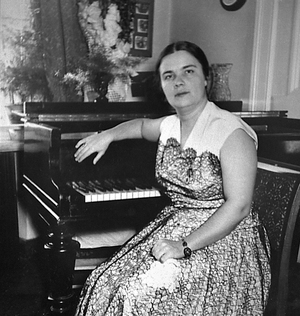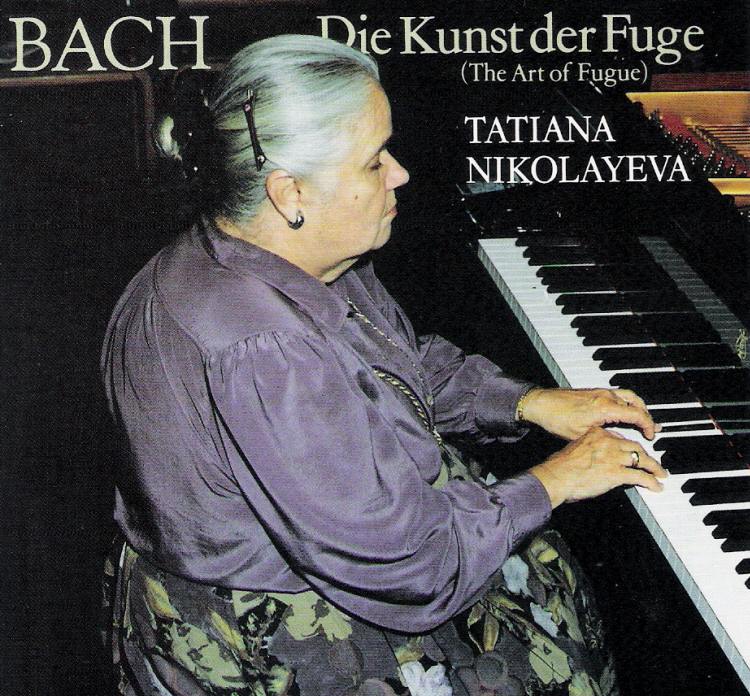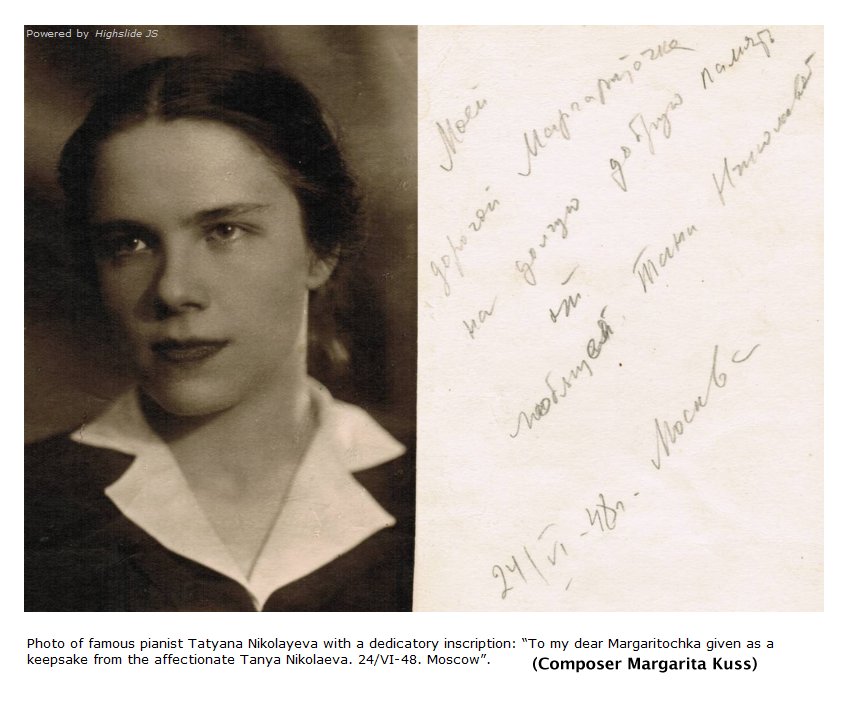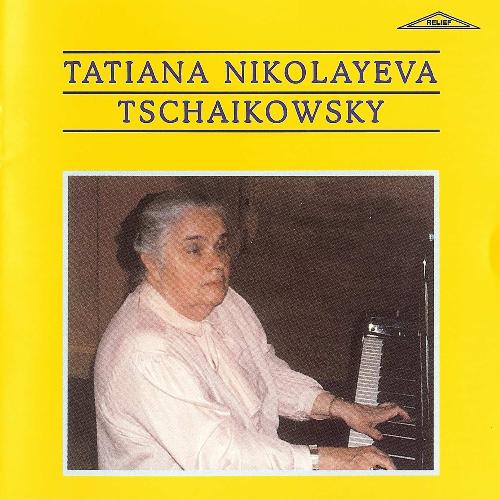A Conversation with Bruce Duffie


| The distinguished Soviet pianist
Tatiana Nikolayeva is a name familiar to many as one of the greatest forces
behind the wealth of piano talent to flood from the former Soviet Union during
the twentieth century. She was born on 4 May 1924 and began playing the piano at the age of three, subsequently entering the Moscow Conservatoire to study with Alexander Goldenweiser and Yevgeny Golubev. She retained her close connection with the Moscow Conservatoire all her life. Indeed, her name was inscribed twice on the marble Roll of Honour there, first as a pianist, then as a composer. After winning the 1950 Bach Leipzig Piano Competition, Nikolayeva built up a phenomenal volume of repertoire, ranging from Bach to Bartók and beyond. Her interpretation of Bach on record won great critical acclaim. Whilst others used so-called 'original' instruments, Nikolayeva preferred to play Bach on a modern Steinway—always with great success. Her long working association with Shostakovich, and her great understanding of all aspects of his music, made her one of the leading sources of contemporary knowledge about that great composer. It was Nikolayeva for whom Shostakovich wrote his 24 Preludes and Fugues, inspired by hearing her Bach-playing at the 1950 Bach bicentenary Competition in Leipzig (he was on the jury), and it was she who premiered them in Leningrad in 1952. Tatiana Nikolayeva died whilst playing the Shostakovich Preludes and Fugues at a public concert in San Francisco on 13 November 1993. |
It is always a privilege for me to speak with musicians
who travel the world and impact our lives. To say that one or another
is special in no way reduces any others who have come before or will come
after. The only implication is being a rare opportunity, and that is
what was afforded me in October of 1992. That was when the Russian
pianist Tatiana Nikolayeva came to Chicago for a recital at Orchestra Hall.
During the era of the Soviet Union, we in the West
knew of a few top musicians. There were rumblings and rumors about
others, but only with perestroika and glasnost did the floodgates open.
We then heard from quite a number of fine performers who, until that time
were confined to the Eastern Bloc countries. One of the most noted
was Nikolayeva, and for a very few years we were able to enjoy not only her
recordings but also her live artistry.
Our time together that afternoon was brief, and
we spoke of only a few topics. Needless to say, however, I came away
with a newfound appreciation for this extraordinary person.
Here is what was said . . . . . .
Bruce Duffie: Thank
you very much for coming to
Tatiana Nikolayeva:
That was in November, 1991. I was very happy about that. The
award was given to me at the Dorchester Hotel on November 18.
BD: Do you play
the same for a recording as you do in a live concert?
 TN: It is very different. The presence of
the audience plays a very, very important role. At the recording sessions,
which usually take place in a studio or in a church, I try to inspire myself
by imagining an audience in my head. I much prefer live performances.
Even if some little technical flaws happen, it doesn’t matter because the
most important thing is the contact with the public. That is very important
for an artist, but you must accept that it is also important to make recordings.
I have made two sets of recordings of the 24 Preludes and Fugues by
Shostakovich. The first was done in
TN: It is very different. The presence of
the audience plays a very, very important role. At the recording sessions,
which usually take place in a studio or in a church, I try to inspire myself
by imagining an audience in my head. I much prefer live performances.
Even if some little technical flaws happen, it doesn’t matter because the
most important thing is the contact with the public. That is very important
for an artist, but you must accept that it is also important to make recordings.
I have made two sets of recordings of the 24 Preludes and Fugues by
Shostakovich. The first was done in
BD: So the newer recording
has improved sound, but is the interpretation also better?
TN: I would say that
my later recording is different. My friendship with Shostakovich lasted
twenty-five years and was very intimate. I absorbed his music and knew
very well how to play it. From 1950 until he died in 1975, I was present
at all of his premieres. I even attended many of the rehearsals. Each new piece was a very big event in the concert
life in
BD: So it was a collaborative
effort between the composer and the performer?
TN: Well, to some extent. He was a man of very few words. He didn’t talk
much. He was very laconic, even, for example, when Mravinsky conducted
his symphonies. But I knew him for 25 years,
so I knew his musical and creative personality. I knew what he wanted.
BD: Having worked so
closely with Shostakovich, does this help you in the presentation of other
composers?
TN: Unquestionably.
He influenced me a great deal. When I was young,
he came to some of my concerts – even
if I didn’t play his works. It was very inspiring and he always gave
me advice. This was very important inspiration. I just want to
add that for a while I was very satisfied playing just the Preludes and
Fugues; I thought that they are so great that it would be enough for
me. But things changed, and I started playing his Trio and his
Quintet and the two Piano Concertos. I recorded his Second Piano Sonata, 24 Preludes Op. 34 (not the Preludes and Fugues Op. 87), and Three Fantastic Dances, Op. 1. Now I play virtually all of his piano compositions,
including a few that I have learned recently. Many pieces I play are
by Shostakovich but not only by him.
BD: Beyond Shostakovich,
how do you decide which works you will learn from this huge repertoire for
the piano?
TN: Considering the wealth
of music I play, sometimes I feel myself a millionaire. I
have a very big repertoire. Sometimes I think I know practically everything
that has been written for the piano! [Laughs] All 32 Beethoven
sonatas, and so much else… But I am never satisfied.
I am always happy to add something new.
BD: You have a wealth
of music in your fingers!
TN: It’s a great thing
to have.
 BD: Do you have any advice for someone who wants to compose
music for the piano?
BD: Do you have any advice for someone who wants to compose
music for the piano?
TN: Not so much is being
written these days for the piano. This is unfortunate, and I am not
happy about it. This is not only in
BD: Since you do some
teaching, what general advice do you have for young pianists?
TN: It’s not easy to
combine my work as a pedagogue with my performing career which takes me all
over the world. I also compose, and of course I have a private life
with my family, so it’s difficult; but I love very much the young generation,
and to be surrounded by the young. When I teach, I also learn from
them and it’s very inspiring. They make me feel younger and I am rejuvenated!
I believe I know what they try to reach, what interests them. I try to help them in their future artistic life
onstage. I play many concerts myself, at least 100 a year, so I think
I know how to help them. The traditions of the
Moscow Conservatory are very rich and all of us who teach are trying to preserve
them. We try to help the youngsters find the spirit of these works,
to be profound and not superficial. The technical mastery is very important,
but what’s even more important is to discover the content of a composition
and to relate it to the public. The modern piano allows so many possibilities.
Its tone palette is so rich. It can sound like a full orchestra, and
the artistic level must come up to the technical level to give the composers
what they wanted.
BD: [With a sly wink]
One last, very easy question. What’s the purpose of music?
TN: [Smiles] Mmmmmm.
The basic purpose of music is to help people in their life. The art
of music, unlike any other form of art, can help human beings to cope with
the tragic losses in life, and bring happiness into their life. This
way, I think, music is unlike any other art. For example, I attended
the concerts of the Chicago Symphony when they came to
BD: Vita brevis,
ars longa!
TN: I agree. Life
is limited, but art is eternal. Music enriches human life and makes
people better.
BD: Thank you for bringing
your music to so many people for so many years.
TN: Thank you.

|
Obituary by James Methuen-Campbell
The Independent, Saturday, November 27, 1993 Tatiana Petrovna Nikolayeva, pianist, teacher and composer: born Bezhitza, Russia 4 May 1924; twice married (one son); died San Francisco 22 November 1993. IT IS difficult to imagine anyone forgetting the experience of hearing Tatiana Nikolayeva play. She was one of those rare artists who had the ability to win over an audience before even reaching the keyboard. Rotund, and frequently wearing a rather startlingly bright dress, she would make her way to the front of the piano, give the audience a heartwarmingly big smile, and then settle her ample frame on to the stool. Everything radiated humility, generosity of spirit and, above all, happiness. I first came across her name on a Melodya LP of Tchaikovsky's Second Piano Concerto, recorded in the early 1950s. Despite a raucous sound quality one immediately became aware of a pianist whose technical accomplishment was imperially comprehensive and yet who also possessed a rarely developed ear for polyphonic writing. Seeking out as many of her recordings as I could, I soon learnt that she was, above all, a Bach player and had won first prize at the International Bach Competition in Leipzig, inaugurated to commemorate the bicentenary of the composer's death in 1750. Dmitri Shostakovich had been a judge at the event and was so impressed and inspired by the 25-year-old pianist's playing that he had written his 24 Preludes and Fugues for her. She would visit his apartment to play them over to him almost one-by-one as they were composed. The Opus 87 set became one of the most important works in Nikolayeva's repertoire, taking up a whole recital programme. Indeed, it was while she was performing the big B flat minor fugue at the Herbst Theater in San Francisco on 13 November that she suffered a massive brain haemorrhage and soon lapsed into a coma. Born in the small town of Bezhitza, near Bryansk, roughly half-way between Moscow and Kiev, Nikolayeva came from a musical family. Her mother, a professional pianist, had studied at the Moscow Conservatory under the celebrated pedagogue Alexander Goldenweizer (1875-1961), and her father was a keen amateur violinist and cellist. Tatiana Petrovna began piano lessons when five and started composing at 12. In the following year she was admitted by competitive examination to the Central Secondary School of Music in Moscow, a branch of the Tchaikovsky Conservatory, where she had instruction from her mother's teacher, Goldenweizer - and she continued with him once at the Conservatory proper. The professor had been a friend of Scriabin, Rachmaninov and Medtner, and inculcated into his students the need to develop the highest proficiency in contrapuntal playing. Bach was very much the order of the day. Amongst Goldenweizer's other students who reached the top of their profession were Grigori Ginzburg, Samuil Feinberg, Dmitri Bashkirov and Lazar Berman. Graduating from the class in 1947, Nikolayeva then studied composition with Yevgeni Golubev. The fruit of this course was a cantata Pesn o schast'ye ('Song about Happiness') and a piano concerto in B, the latter a piece that she later recorded with the USSR State Symphony Orchestra under the eminent conductor Kiril Kondrashin. Ultimately, though, her best-known works are a set of 24 Concert Studies, firmly polyphonic in style, and a faithful and unfettered transcription of Prokofiev's Peter and the Wolf, a recording of which has recently been released by RCA Victor in Japan. Though she had made her official debut in 1945, it was not until after the Leipzig Bach Competition that Nikolayeva's career really took off. Appearances, however, were very much restricted to Eastern Bloc countries, and she never achieved the 'favoured artist' status that was the prerequisite to enable any Soviet musician to play abroad during the Cold War years. Nikolayeva started teaching at the Moscow Conservatory in 1959, and from 1965 was a professor. It was her standing as such that led her to be invited to sit as a jury member for various different international piano competitions; she was at the Leeds Competition in 1984 and 1987. Nikolayeva's career in Britain resulted from contacts made during the course of these visits. By this stage there was a dearth of older Russian pianists playing in the West: Emil Gilels had died, and Svjatoslav Richter's concert-giving was becoming, at best sporadic. I don't think, however, that any concert promoter in Britain had guessed at the extent of the success Nikolayeva was to enjoy. Her appearances at the Proms were greeted with terrific enthusiasm and in 1991 Hyperion's CDs of the Shostakovich Preludes and Fugues were given a Gramophone Award. It is only to be hoped that several of her earlier Melodya discs will be reissued. She had a colossal repertoire and specialised in playing cyclical works. Aside from the Shostakovich, though, Tatiana Nikolayeva will be remembered as a Bach player who flung stylistic considerations to the winds and played the music with an irrepressible musical intelligence and knowledge of the resources of her chosen instrument. |
This interview was recorded in the the office suite at Orchestra
Hall in Chicago on October 16, 1992. Translation at that time was graciously
provided by Ella Braker, a violinist with the Chicago Symphony. In
preparing this transcription for website presentation, the translation was
edited by Sergey Zaks. Portions (along with recordings) were used on
WNIB the following day, and again in 1994 and 1999. It was also used
on WNUR in 2006, and on Contemporary Classical Internet Radio in 2006, 2010
and 2011. It was transcribed and posted on this website in 2012.
To see a full list (with links) of interviews which have been transcribed and posted on this website, click here.
Award - winning broadcaster Bruce Duffie was with WNIB, Classical 97 in Chicago from 1975 until its final moment as a classical station in February of 2001. His interviews have also appeared in various magazines and journals since 1980, and he now continues his broadcast series on WNUR-FM.
You are invited to visit his website for more information about his work, including selected transcripts of other interviews, plus a full list of his guests. He would also like to call your attention to the photos and information about his grandfather, who was a pioneer in the automotive field more than a century ago. You may also send him E-Mail with comments, questions and suggestions.